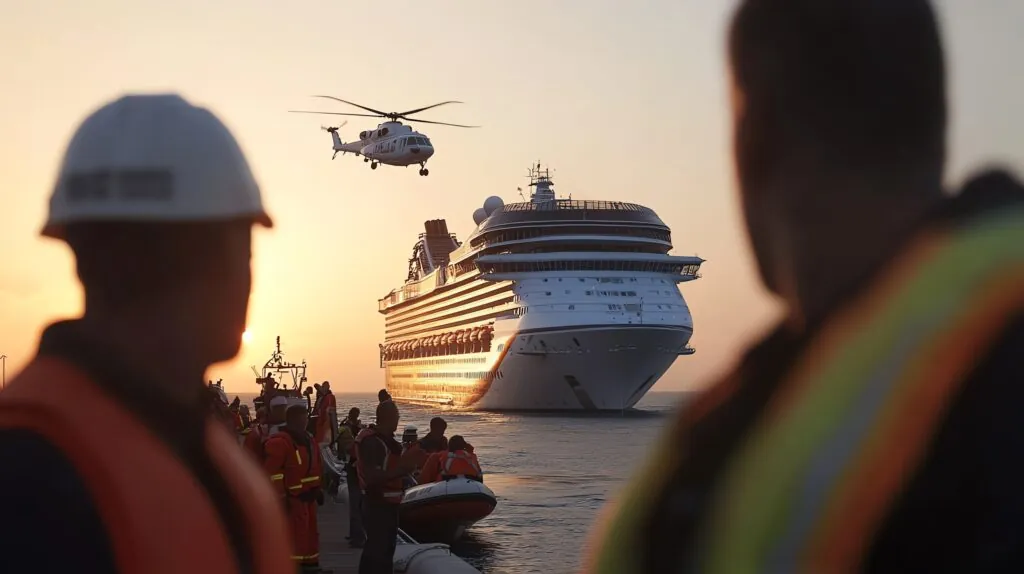Cruise Medical Evacuation Failures: Passenger Legal Options
A cruise vacation is often envisioned as an all-inclusive escape—sun-soaked decks, endless buffets, and world-class entertainment. But what happens when that dream is shattered by a sudden medical emergency?

When you’re hundreds of miles away from land and dependent on the cruise line’s onboard resources and emergency protocols, every second matters. If the cruise line fails to act quickly and appropriately, the consequences can be catastrophic.
Unfortunately, there have been many cases where cruise lines delayed medical evacuations or outright denied them, leading to prolonged suffering, permanent injury, or even death. This article explores what happens in these situations, what legal options are available to victims and their families, and how you can protect your rights if you find yourself in this terrifying situation.
Understanding Medical Emergencies at Sea
The Reality of Cruise Ship Medical Facilities
Cruise ships typically have onboard medical centers staffed with at least one licensed doctor and several nurses. These facilities can handle minor injuries and routine health concerns. However, they are not equipped for critical care or advanced diagnostics.
In life-threatening situations such as heart attacks, strokes, or traumatic injuries, the standard procedure is for the ship to initiate a medical evacuation, usually via helicopter or emergency docking at the nearest port.
The Importance of Timely Evacuation
Medical evacuation is considered a last resort, but it becomes necessary when the onboard team determines that they cannot handle the situation adequately. Timing is crucial. In many emergencies, a delay of even a few hours can mean the difference between recovery and long-term damage—or worse, death.
Who Decides When to Evacuate?
The decision to escalate a case for medevac generally lies with the ship’s medical staff. However, in some cases, cruise management becomes involved, which can complicate or delay the process.
Financial and logistical considerations—such as the cost of a helicopter or the inconvenience of rerouting the ship—should never override the health needs of a passenger. Yet, evidence shows that these factors sometimes play a role in denial or delay.
What Can Go Wrong?
Common Failures in Cruise Medical Emergencies
Despite the protocols in place, many things can go wrong in a medical emergency at sea. Cruise lines have been known to delay evacuations for various reasons, including weather conditions, distance from land, or internal disputes about the necessity of a medevac.
Some of the worst cases involve outright negligence—either by failing to recognize the severity of a medical condition or by downplaying it to avoid the cost or complexity of evacuation.
Real-World Consequences of Delay
There are several documented instances where passengers displayed clear signs of life-threatening conditions such as strokes or heart attacks, only to be told by the ship’s medical team that they were simply dehydrated or anxious.
In one such case, a man exhibiting textbook signs of a heart attack was kept onboard overnight, with no medevac requested. He died the following morning before the ship reached port.
Refusals to Disembark at Nearby Ports
In other cases, passengers were denied permission to disembark at the nearest port for medical treatment. Some ships have bypassed closer ports in favor of scheduled destinations, despite a passenger’s deteriorating condition.
These decisions—often made to preserve the cruise itinerary—can have life-altering consequences for the person needing immediate care.
Your Legal Rights as a Cruise Passenger
Duty of Care Under Maritime Law
Under maritime law, cruise lines have what is known as a “duty of care” to their passengers. This means they are legally obligated to provide reasonable care and safety, including appropriate responses to medical emergencies.
If a cruise line fails in this duty—by delaying a medevac, providing substandard medical care, or ignoring urgent symptoms—they can be held liable.
Legal Grounds for a Lawsuit
If you or a loved one were harmed due to delayed or denied medical treatment aboard a cruise, you may be able to file a lawsuit for damages. These may include:
- Medical expenses
- Pain and suffering
- Lost wages
- Wrongful death compensation
Jurisdiction in International Waters
One of the most common questions is whether a passenger can sue if the incident occurred in international waters. The answer is often yes.
Many cruise lines are headquartered in the United States and have clauses in their ticket contracts that dictate where lawsuits must be filed. Florida, in particular, is a common jurisdiction for cruise-related litigation.
Be Aware of Legal Time Limits
It’s essential to act quickly. Many cruise lines include clauses that limit the time you have to file a lawsuit—sometimes as little as six months from the date of the incident. Missing that deadline can void your right to sue.
Signs You May Have a Legal Case
Legal experts agree that several red flags may indicate negligence or mishandling of a medical situation aboard a cruise. These include:
- The ship’s medical staff refused or delayed calling for a helicopter, despite serious symptoms.
- You were denied permission to disembark at a nearby port for emergency treatment.
- The ship’s doctor misdiagnosed your condition, leading to a worsening health outcome.
- No documentation or clear medical notes were provided about your treatment.
- The cruise line failed to communicate with your family or emergency contact during the crisis.
If any of these apply to your experience, you should speak with a qualified maritime personal injury attorney as soon as possible.
How to Document a Cruise Medical Negligence Case
Collecting Evidence Onboard
If you believe your medical emergency was mishandled on a cruise, documentation is key.
Request copies of all onboard medical records before you disembark. This includes doctor’s notes, treatment summaries, and communications logged by the medical team.
Take photographs of any injuries or visible symptoms that may support your claim. If your condition allows, or a family member is with you, record conversations with staff (if legal) that relate to treatment decisions or refusals.
Seeking Medical Evaluation Immediately
Upon disembarkation, visit a hospital or medical clinic for evaluation. This serves both your health and your legal claim. Independent medical documentation can corroborate the negligence or misdiagnosis that occurred onboard.
Legal Consultation is Crucial
Do not sign any forms or waivers presented by the cruise line without first consulting a lawyer. These documents may be designed to protect the cruise line from liability.
Real Legal Cases and Precedents
Case Study: Denied Helicopter Evacuation
In one notable case, a cruise passenger suffered a cerebral aneurysm but was denied evacuation for nearly 12 hours. The ship’s medical staff insisted she was simply dehydrated. By the time a helicopter was called, it was too late. Her family filed a lawsuit and received a substantial settlement for wrongful death and negligence.
Case Study: Onboard Misdiagnosis
Another passenger suffered a severe asthma attack but was given insufficient care and denied evacuation. He survived but with long-term complications. The legal case highlighted the cruise line’s failure to follow standard emergency procedures, resulting in a successful personal injury claim.
Finding the Right Maritime Injury Attorney
Not all personal injury attorneys are experienced in maritime law. This specialized legal field requires knowledge of international regulations, cruise ticket contracts, and medical liability standards at sea.
When choosing representation, look for attorneys or firms with direct experience handling cruise ship injury cases, particularly those involving medical negligence or evacuation issues.
Ask questions like:
- Have you successfully handled cruise ship cases?
- What outcomes have you secured for medevac delay claims?
- Do you offer a free consultation?
Many reputable maritime attorneys work on a contingency basis, meaning they only get paid if you win.
Frequently Asked Questions
Can I sue a cruise line if they failed to evacuate me during a medical emergency?
Yes, you can sue a cruise line if their failure to arrange timely medical evacuation resulted in harm to your health or the death of a loved one. Cruise lines have a legal duty to provide reasonable care to passengers, including taking swift action in life-threatening situations. If that duty was breached through delayed or denied medevac, you may be entitled to compensation under maritime personal injury laws.
What if the cruise ship doctor misdiagnosed my condition?
If a cruise ship’s medical staff misdiagnoses your condition and that misdiagnosis leads to worsened health outcomes, you may have a viable claim for medical negligence. This is especially true if the failure to properly identify and treat the condition resulted in avoidable complications, extended recovery time, permanent injury, or death.
Can I still file a claim if the incident occurred in international waters?
Yes, most major cruise lines are headquartered in the United States and include provisions in their ticket contracts that allow legal claims to be filed in U.S. courts—most commonly in Florida. The location of the incident (such as international waters) does not automatically disqualify you from pursuing legal action, although it may affect which laws apply and how the case proceeds.
How long do I have to file a lawsuit against a cruise line?
You typically have a very limited window to file a lawsuit against a cruise line. Most cruise ticket contracts require that written notice of the claim be submitted within six months of the incident and that a formal lawsuit be filed within one year. These deadlines are usually strictly enforced, so it’s essential to speak with an attorney as soon as possible after the event.
What kind of compensation could I receive if my case is successful?
If your lawsuit is successful, you may be eligible to recover various forms of compensation, including medical expenses, lost income, pain and suffering, emotional distress, and future care costs. In the event of a fatality, surviving family members may also seek damages for wrongful death, including funeral costs and loss of companionship.
Conclusion: Navigating the Legal Waters After a Cruise Medical Failure
Cruise ship medical evacuation failures are more than unfortunate events—they can result in irreversible harm or loss. Cruise operators have both ethical and legal obligations to act swiftly during onboard medical emergencies. When they fail in this responsibility, victims and their families have every right to seek justice.
Understanding your rights, gathering the right documentation, and consulting with a legal expert can make the difference between suffering in silence and obtaining fair compensation for your ordeal.
Contact The Cruise Injury Law Firm Today
Have you or a family member experienced a mishandled medical emergency on a cruise?
Don’t try to navigate this complex legal process on your own. Contact The Cruise Injury Law Firm today. We offer free consultations and work on contingency, meaning you don’t pay unless you win.
Take action now—your rights and your recovery depend on it.






